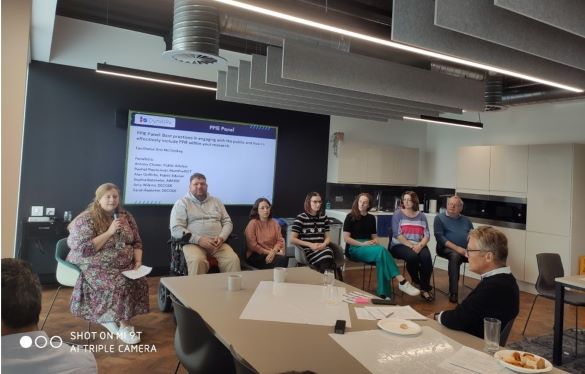Communicating AI in Health Research – Early Career Researchers Workshop Blog Post

Civic Health Innovation Labs (CHIL) was buzzing with conversation on Tuesday, 2nd July 2024 for the DynAIRx Research Team's 'Communicating AI in Health Research' workshop.
DynAIRx is one research project within the NIHR funded AI for Multiple long-term conditions programme (AIM). This whole day workshop was organised as part of the training and networking opportunities offered to Early Career Researchers (ECRs) through the AIM Research Support Facilities ECR Network. For this event, we gathered a fantastic group of researchers and public advisors from across the UK. Many working on other AI for Multiple Long Term Conditions projects.
The morning started with an address by DynAIRx Co-Principal Investigator Lauren Walker, who explained the importance of being able to communicate research effectively. Dr Walker spoke about the value of engaging with the public to make transformational changes in research and how public and patient involvement positively impacts healthcare. Working with members of the public may help develop novel approaches researchers haven’t considered and may help researchers find ways in which they can better communicate their research to a wider audience. Dr Walker summed up her presentation with the following quote from Sir Mark Walport, Former Chief Executive of UKRI and Director of the Wellcome Trust: “Science isn’t finished until it’s communicated. The communication to wider audiences is part of the job of being a scientist, and so how you communicate is absolutely vital”. This emphasised the importance of strengthening communication skills as researchers.
Media trainer Stephanie Power then challenged the group to explain their research in less than 60 seconds, as well as other techniques for media interviews. Attendees were encouraged to write blogs and to be active on social media to increase their chances of participating in interviews. Both researchers and public advisors reported they thought the session was engaging and thought provoking.
An engaging public participation involvement and engagement panel consisting of Antony Chuter, Rachel Placinski, Alan Griffiths, Sophia Batchelor, Amy Wilkins & Sarah Rabbitte started the afternoon. This panel session included important discussions about the difference between a “lay” patient and an “expert” patient and suggestions for ways to broaden recruitment for hard-to-reach groups. This could be as simple as booking and pre-paying travel for people with the wise words “you can overcome challenges often just by listening”.
Breakout sessions then allowed for greater focus on communicating AI in grant applications, and key public questions on AI and data. These were delivered by Iain Buchan, Samuel Relton and Emily Rempel, respectively. Those who chose to take part in the communicating AI session heard about how writing grants is storytelling and why resilience matters. They had discussions about communicating clearly, thinking about the audience, and ensuring that every sentence in your communications has a purpose.
The team wrapped up the day with a series of lighting talks to share ideas about how to communicate research, and why it's important. There was plenty of positive feedback. Hattie Cant, data scientist attendee, shared: “there were some really important chats that were had, and it was brilliant to be at an event where Public and Patient Involvement (PPI) contributors actually had more to give than any of the researchers. The PPI contributors really led the day with sharing their experiences and perspectives, which is something you don't see a lot of, so kudos for having made it an inclusive environment that allowed those voices to be heard.”